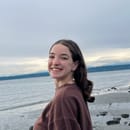What can you do with a degree in the humanities? How can the skills you learn as an undergraduate be applicable to your future career? Being that there is no direct professional pathway with a liberal arts degree, these questions tend to be on the minds of humanities students, including second-year Julia Park, a double major in English and Journalism. I met Julia last year in Humanities First, an academic program for first-year students to introduce them to the humanities, and I sat down with her to talk about her experience. As a Humanities First scholar and current intern with the program, Julia shares how its curriculum has helped her in both an academic and professional capacity.
In your own words, what is Humanities First?
“Humanities First is essentially a program intended for freshmen at UW to introduce them to the humanities field. Last year, I took this course sequence, there’s three in a row—you take them fall, winter, spring—and they were taught by different professors who are all part of this program. That is kind of the basis, it introduces you to the study of the humanities and why they matter in our world. And we focus on asking questions more than looking for straight answers about the human experience.”
How did you find out about the program? What inspired you to sign up?
“I remember I had graduated high school, and before we registered for classes I got an email…they reached out to me saying, ‘We have this new program starting. It’s called Humanities First. We noticed that you applied to UW saying you wanted to major in a humanities field, so we are going to give you priority registration for it.’ And I jumped at that opportunity because I knew I liked the humanities, but I wasn’t sure how it was going to translate into a career. So that was what inspired me to take this program. It [would] introduce me to the relevance of the humanities to everyday life and why it matters.”
How has Humanities First helped you in your college career and beyond?
“Last year, we had to write these response papers. They were not very long, maybe one to two pages, but I realized that unlike high school, the questions are very open-ended. And I feel like through that process, I found my voice in a deeper way than I had before as a writer. That was very exciting because coming into college, you don’t really know how to write for college yet. You might if you took AP or IB classes in English, but that class helped me relax a little bit and just express my thoughts. So I would say it definitely helped me with academic writing.
“We were [also] assigned media campaign projects [each quarter]…so that might mean making an Instagram profile and posting about the different topics we were learning, or making a zine, or some groups did a podcast. And you work with other students in the program to take what you’re learning in class and communicate important ideas to an audience that’s not academia. It was creative and it also incorporated what we learned in class, so it was a really fresh way of doing things.”
Students were also able to create their own e-portfolio to document their undergraduate experience. “For the e-portfolio, we [got] to create our own website. The assignment was to create an ‘About Me’ page, [as well as] adding different aspects of your college experience to keep track of them throughout your years at UW. And I liked that assignment because I think it forced me to think of my UW experience as a cohesive journey. It gave me the chance to express who I was as a student at that point, and [now] I have something to reflect on and go off of going forward, as different changes came up in my interests, academics, and career-oriented activities.”
How did Last year’s remote learning Environment affect your experience?
“I was definitely disappointed that we couldn’t go on the field trips. That would have been really fun to go and see the Burke Museum and there were other places we couldn’t go to because it was online. But I was very surprised—in my other classes, people kept their cameras off and it was not very interactive—the people I met in Humanities First last year, a lot of them I still know today. So that was really great, just being able to create relationships on Zoom, that was still a big part of the experience. The professors did a great job teaching online too. I think in general it went really well.”
In your own words, what is Humanities Next?
“The Humanities Next program is for students who completed the Humanities First sequence last year: they’re called Humanities First Scholars. This group of students meets every other week or so, and we discuss ways to improve or deepen the Humanities First experience for the first-year students. It’s up to us, and to Professor Stroup who leads it, what we focus on. The two sort-of arms of our cohort are mentoring, creating programming or activities to support Humanities First students now, and communication and outreach. We’ve reached out to alumni that were UW humanities majors and we’ve reached out to different campus groups about our program. It’s been a really great experience, just to stay with the program for another year.”
This quarter, interns have been planning a career panel with UW humanities Alumni.
Can you provide a brief synopsis of the panel? What can attendees expect?
“The Humanities Next interns are preparing to execute a humanities career panel. We reached out to several alumni that [have previously been spotlighted] on the Humanities First website. We took their names and we got their contact info, [then] we reached out to them asking them if they would like to be panelists at our event.
“We will be having a moderated discussion with these panelists: asking them to share a little bit about who they are, their career paths from humanities majors, and how [their humanities education] has helped them in their day-to-day lives. Students can also ask any questions they have on their own during our open Q&A.
“For humanities students, it’s often difficult and a little bit overwhelming to understand how your English major or your Cinema & Media Studies major can translate to a career because it’s not so linear or so direct as maybe engineering or computer science. But many people have done it successfully, so I’m hoping that through this panel, students can be encouraged and learn a little bit more about what that career path can look like for them.”
What inspired your idea for this project? How would you describe your role in its execution?
“I had wanted to do something a little bit more in-depth with the Humanities Next program, partly [because] one of our Honors requirements is doing an experiential learning activity; I wanted to pave my own path here. And I’m not sure how I came up with the idea now, looking back, but I just personally felt that the humanities major-to-career path has been kind of fuzzy and scary, and I wanted to explore that with other people through this panel.
“My role has basically been facilitating the effort with other intern-mentors: we’re all a team. We’ve been planning this for several weeks now, and it’s something that we’ve all poured a lot of ideas into, and time. I write agendas for our planning meetings; I help select the panelists to invite; I write the emails to the panelists…[I am] the coordinator of all the different moving parts as we move towards it.”
The Humanities First Career Panel is taking place on Thursday, March 3rd at 5 PST. You can register here.


